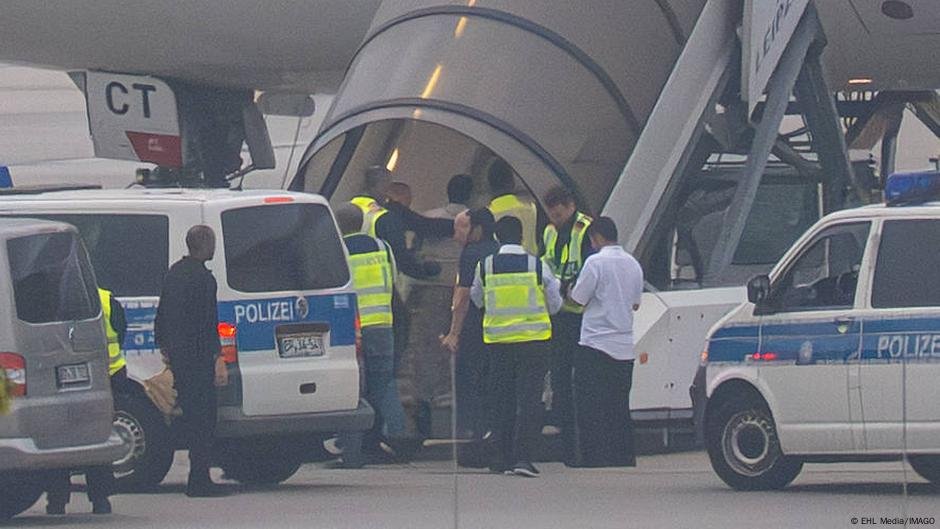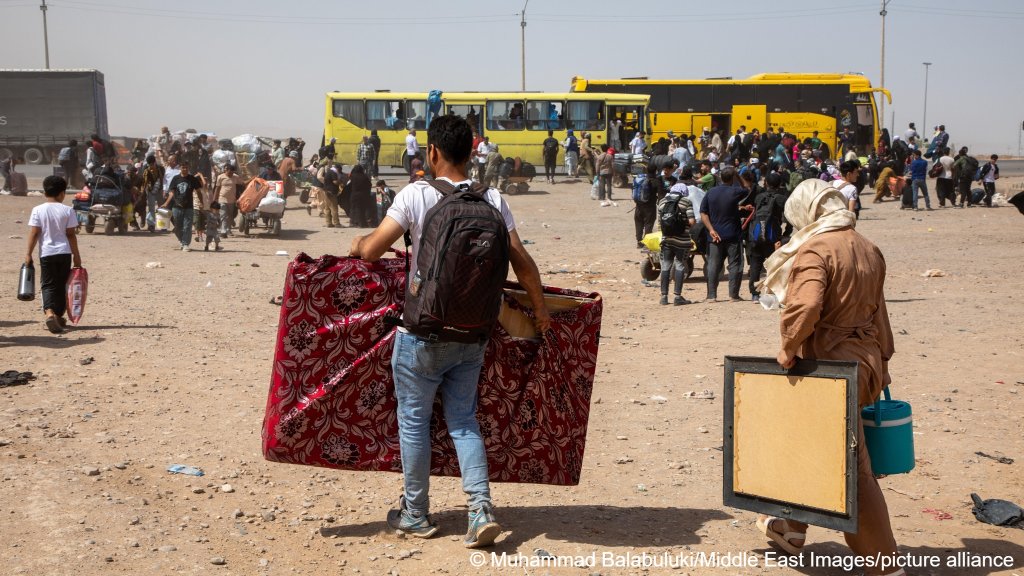Recent headlines in the German press have focused on money being paid to criminals being deported from Germany. Some of the thousands of people obliged to leave Germany do receive financial support when deported, but these payments differ depending on the state the person got deported from. InfoMigrants went to find out more.
Almost 7,500 rejected asylum seekers and others obliged to leave Germany have been deported by plane to their home countries during the first six months of this year.
As regional public broadcaster MDR reported last week, the 81 rejected asylum seekers on board the deportation flight from Leipzig to Kabul on July 18 -- the first such flight in over a year -- were serious and most serious criminal offenders.
What's more, they all received cash benefits as return support -- but the sums varied depending on the state responsible for their deportation and their financial situation.
For instance, Afghans for whom the southern state of Bavaria was responsible received no more than 100 euros, whereas four convicted criminals from Thuringia each reportedly received 1,000 euros.
Since Germany's 16 states are responsible for payments to deportees, InfoMigrants contacted the responsible ministries of seven of them -- Bavaria, Saxony, Saxony-Anhalt, Baden-Württemberg, North Rhine-Wesphalia, Schleswig-Holstein and Rhineland-Palatinate -- plus the federal Interior Ministry to get a clearer picture of the extent and policies towards cash payments for deported persons.
Read AlsoGermany: Rollout of payment card for asylum seekers remains patchy
Which criteria are used to determine the payments?
When it comes to financial support for people obliged to leave Germany in the context of a deportation, no legal regulations govern the payments, a spokesperson for the Federal Interior Ministry told InfoMigrants.
"Whether payments are made and, if so, how much, is decided at the discretion of the competent authorities in the federal states," the spokesperson said, adding that this explains the different terms for and amounts of the payments.
When it comes to the question of why the money was paid, all state ministries cited two reasons: securing deportees' immediate travel and provision in the home country as well as making sure the deportation can go ahead. Courts in Germany can issue a deportation ban if it can be demonstrated that the deportee would be at risk of immediate impoverishment once they reached their destination.
Migrants deported from the southern state of Baden-Württenberg need to "credibly demonstrate" that they lack sufficient financial means to reach their destination in their home country or that they cannot provide themselves with the necessary provisions until they arrive there.

If that's the case, an "appropriate amount of pocket money may be provided," the ministry stated.
A spokesperson for the responsible ministry in North Rhine-Westphalia (NRW) echoed this statement, adding that the cash payments are first and foremost to ensure the deportation's legality. Citing a ruling by Germany's Federal Constitutional Court, the spokesperson noted that a deportation ban can be issued if the deportee is at risk of immediate impoverishment.
The other ministries approached by InfoMigrants provided similar answers.
Varying amounts
When it comes to the monetary support for repatriated persons, the amount of cash distributed varies from state to state and from person to person.
Answers from the seven states InfoMigrants surveyed ranged from as low as 50 euros up to 1,000 euros and more.
Several states told us there were exceptions to their respective rules (see next chapter): In NRW, for example, more than 50 euros is paid in case they need more to reach their final destination after landing.
The ministry further said that the payment is made by the foreigners' office responsible for the deportation when the repatriation is carried out.
While the baseline is 30 euros in Rhineland-Palatinate, up to 1,000 euros may be paid out "in cases of deportation of destitute persons in special circumstances."
The ministry in Rhineland-Palatinate told InfoMigrants that the federal government last year favored paying 1,000 euros to Afghans in the context of last year's deportation flight to Afghanistan, the first one since the Taliban takeover in 2021.
As part of the new government, in power since this May, the Federal Interior Ministry told InfoMigrants in a written statement that "unlike during the last legislature," it has "expressly not issued any guidelines" on the amount (Handgeld) to be paid out.
It furthermore stated that Bavaria and other states have paid between zero and 100 euros, depending on the deportee's situation. "If some states have paid more, that was their own decision," the ministry spokesperson said.
The ministry in Rhineland-Palatinate further explained that the amount varied nonetheless depending on each deported person's financial situation: While two of the six Afghans in last year's sole deportation flight from Rhineland-Palatinate received the full 1,000 euro amount, three received money that brought what they already had up to the maximum 1,000, (it wasn't specified how much that was for each individual), and one received nothing.
Read Also43 Iraqis deported from Germany on deportation flight to Baghdad
How is return assistance calculated?
The individual sum deportees receive depends on a number of factors. MDR reported that the basis is a means test, that is an assessment of the person's assets. If the person has sufficient means, they won't get anything.
Average income and cost of living in the destination country, as well as the individual needs of deportees, such as illness or disability, are also part of the assessment basis, according to MDR. The individual needs are evaluated differently from state to state though.
The 1,000 euros in return assistance is based on guidelines from the Federal Ministry of the Interior's REAG/GARP program, according to German public broadcaster news show Tagesschau information.
The aim of the assistance is reportedly to motivate asylum seekers who are obliged to leave the country to voluntarily return to their home country or a third country. In addition to money for the flight or bus ticket, a one-time subsidy of 1,000 euros per person is recommended, and 500 euros for minors.

According to MDR citing the Federal Interior Ministry, a total of 21.5 million euros was paid out in return assistance in 2023.
According to the responsible ministry in Saxony, the return support is calculated on the basis of personal circumstances and the cost of living in the home country. The amount also often goes by court rulings about similar cases, the ministry added.
In Saxony-Anhalt, the cash payments depend on the type of deportation (e.g. Dublin cases --where a person is being returned to another EU state, their first of entry in the bloc, where they have perhaps already applied for asylum), deportees' age and how needy they are.
Dublin cases, for instance, receive 30 euros, and solo travelers generally get 50 euros.
Cash allowance versus 'subsistence income'
Based on the answers we received, there are two different types of financial support for deportees: so-called Reisebeihilfen (travel aid) or Handgeld (literally hand money, i.e. cash allowance), and Existenzsicherungsmittel (subsistence income, i.e. financial means to secure your livelihood).
All are paid in cash in euros, according to the ministries.
The purpose of Handgeld is to ensure that deported persons can travel from the airport to their final destination, as well as make urgent purchases on their way there including food, water and a sim card.
The amount of Handgeld is a voluntary payment and thus varies between 25 and 50 euros depending on the federal state, MDR reported. Most states contacted by InfoMigrants stated that adult migrants receive 50 euros, while children traveling with their family are entitled to 25 euros. In Saxony, children 12 years or younger could be paid 25 euros.
Both the ministry in NRW and the Federal Interior Ministry noted that in addition to the cash allowance, some deportees might get extra reintegration support through the EU Reintegration Program, which offers individual assistance for returnees in their home countries -- if they meet the requirements.

Existenzsicherungsmittel, on the other hand, are non-legally binding repatriation grants to secure a minimum care for a certain period of time. According to MDR, this includes a ticket to reach returnees' hometown, or money for medical supplies for the ill or disabled. This support, which is covered by the states, is only accessed if the deportee is out of money.
In the case of Afghans, for example, the ministry in Rhineland-Palatinate told InfoMigrants that the 1,000 euros they receive is to guarantee their living expenses "for a transitional period above the poverty line".
It is however important to note that the terms and services used in deportations are not clearly distinguished by the authorities of the federal states.
Moreover, five of the seven ministries that answered our questions either stated that the payments are not recorded statistically or didn't comment on this particular issue.
The only reliable figure provided is the 44,000 euros paid out in Handgeld to at least 1,010 persons last year in NRW.
Read AlsoAfghans seeking German visas in Pakistan fear deportation
How many deportations from Germany have taken place this year?
All ministries that replied to our request for comment provided current deportation figures.
Some 2,500 persons including Dublin cases and close to 1,788 persons were deported from North Rhine-Westphalia and Bavaria -- Germany's two most populous states -- as of June 3, respectively.
In Saxony-Anhalt, which has one ninth of the population of NRW, 348 people were deported as of July 31. Saxony, Germany's sixth-most populous state, deported 506 people as of June 30.
The figures for Baden-Württemberg, Rhineland-Palatinate and Schleswig-Holstein were 2,210 as of late July, 591 and 436 (both as of late June) respectively.
Across Germany, 6,000 people were deported in the first three months of this year, 28 percent more than during the same period last year.
